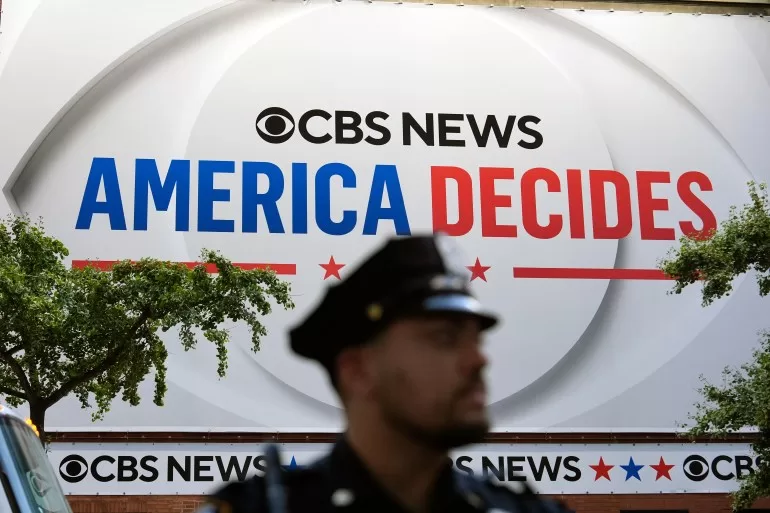It was a battle royal between two Midwestern politicians, both vying to be vice president of the United States.
But Tuesday’s debate between Minnesota Governor Tim Walz and Ohio Senator JD Vance was overshadowed by events unfolding in the Middle East, where – hours earlier – Iran fired a barrage of ballistic missiles in response to Israel’s deadly attacks in Lebanon and Gaza.
“There will be consequences,” Walz, a Democrat, said of Iran’s actions. The Republican candidate Vance, meanwhile, underscored the unwavering US support for Israel.
“It is up to Israel what they think they need to keep their country safe, and we should support our allies wherever they are when they’re fighting the bad guys,” Vance said.
The debate marks one of the last major milestones in the US presidential race. Hosted by CBS News in New York, the event arrives a mere five weeks before election day on November 5.
It will also likely be the first and only time Vance and Walz confront one another on stage, not to mention the final debate of the 2024 election cycle.
With the race hurtling towards a nail-biting finish, each candidate tried to make the case for why their ticket should emerge victorious. Vance, the running mate for Donald Trump, argued his candidate would bring “common sense” to the White House.
Meanwhile, Walz played up Democratic candidate Kamala Harris and her track record of “steady leadership”, while attacking Trump as a chaotic force.
Here are five key takeaways from Tuesday’s debate.
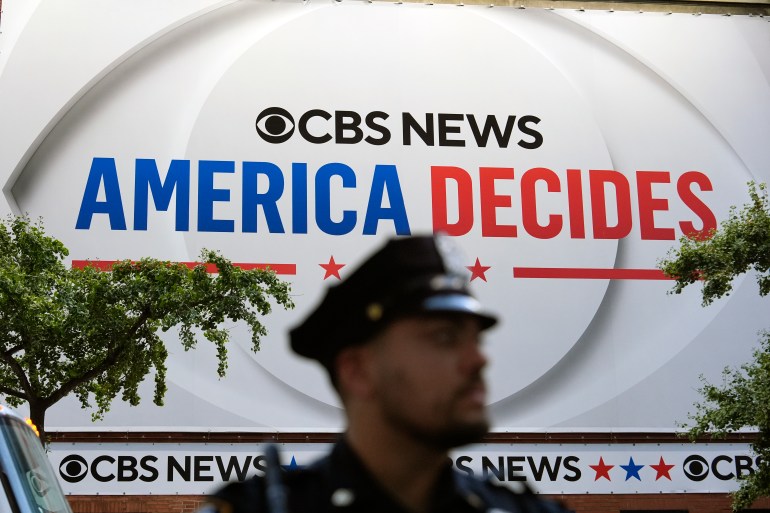
Opening question centres on Israel
Iran’s missile attack against Israel – and Israel’s warnings that Iran “will pay” – loomed large as the lights came up on the debate stage.
Moderator Margaret Brennan opened the proceedings with a question about what should come next: Would the candidates support Israel if it chose to launch a strike against Iran?
Walz was up first. Initially, the Minnesota governor appeared to stumble, repeatedly calling several policy goals “fundamental”.
“Israel’s ability to be able to defend itself is absolutely fundamental. Getting its hostages back – fundamental. And ending the humanitarian crisis in Gaza. But the expansion of Israel and its proxies is an absolute fundamental necessity for the United States to have a steady leadership there,” Walz said.
“What’s fundamental here is that steady leadership is going to matter.”
Where Walz hit his stride, however, was in attacking Trump as a divisive and destabilising figure.
“It’s those who are closest to Donald Trump that understand how dangerous he is when the world is this dangerous,” Walz said.
He further criticised then-President Trump for pulling out of the Joint Comprehensive Plan of Action (JCPOA) in 2018, bringing an end to a multilateral agreement that included restrictions on Iran’s nuclear programme.
“We had a coalition of nations that had boxed Iran’s nuclear programme in,” Walz argued. “Donald Trump pulled that programme and put nothing else in its place. So Iran is closer to a nuclear weapon than they were before because of Donald Trump’s fickle leadership.”
When the moderators turned to Vance, the senator initially sidestepped the question, using his opening remarks to introduce himself to the audience as a child of the working class.
“I recognise a lot of Americans don’t know who either one of us are,” Vance told the camera.
He eventually pivoted to the question at hand. Vance argued that Trump, during his four years as president from 2017 to 2021, made the world safer by projecting strength and spurring fear.
“As much as Governor Walz just accused Donald Trump of being an agent of chaos, Donald Trump actually delivered security in the world, and he did it by establishing effective deterrence. People were afraid of stepping out of line,” Vance said.
“Donald Trump recognised, for people to fear the United States, you needed peace through strength.”
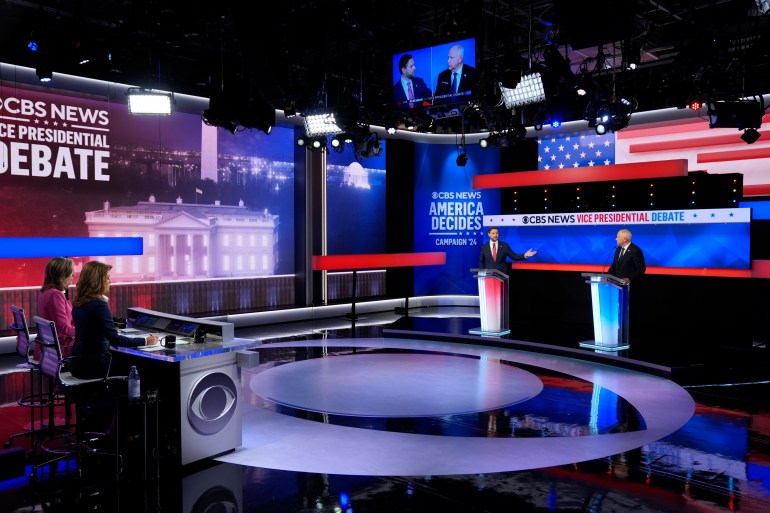
Vance softens incendiary rhetoric on immigration
The vice presidential debate took place three weeks after Trump and Harris themselves faced off in a televised showdown, and one topic was quick to reemerge: immigration.
Tuesday’s event revisited one of the most viral moments from that previous presidential debate, concerning the burgeoning Haitian American community in Springfield, Ohio.
On September 10, Trump took to the debate stage to repeatedly claim – without evidence – that Haitian migrants in Springfield were abducting and eating neighbourhood cats and dogs.
Vance himself had helped spread those rumours online. He later justified his actions by telling reporters, “If I have to create stories so that the American media actually pays attention to the suffering of the American people, then that’s what I’m going to do.”
On Tuesday, Walz attacked Vance for his role in the fear-mongering, which resulted in tensions and even bomb threats in Springfield.
“Talking about and saying, ‘I will create stories to bring attention to this’ – that vilified a large number of people who are here legally in the community of Springfield,” Walz told Vance across the debate stage.
“There are consequences for this,” Walz continued. “The consequences in Springfield were the governor had to send state law enforcement to escort kindergarteners to school.”
Vance avoided repeating the unfounded allegations about Haitian migrants. He did, however, blame what he described as unchecked immigration for straining local resources.
“In Springfield, Ohio, and in communities all across this country, you’ve got schools that are overwhelmed, you’ve got hospitals that are overwhelmed, you’ve got housing that is totally unaffordable, because we brought in millions of illegal immigrants to compete with Americans for scarce homes,” Vance said.
“The people I am most worried about in Springfield, Ohio, are the American citizens who have had their lives destroyed by Kamala Harris’s open border.”
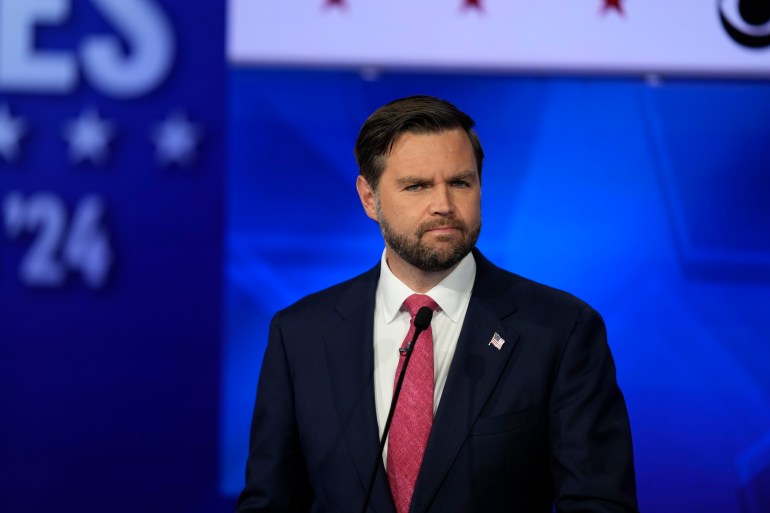
Fact-checking under Republican scrutiny
The question of how to address unfounded rumours and baseless allegations was in the air even before the candidates began to speak on Tuesday.
CBS News, the debate host, had announced its moderators would not conduct fact-checking live on air, as the vice presidential candidates spoke. The news agency instead offered viewers the opportunity to scan a QR code to receive a factual analysis of the claims made on the debate stage.
The decision was a reaction to backlash from the Trump camp, which opposed the way moderators pointed out falsehoods during the September 10 debate.
The Trump team has continued to oppose fact-checking during its candidates’ media appearances.
Earlier on Tuesday, a campaign spokesperson said that Trump rejected an interview with the CBS News program 60 Minutes in part because it “insisted on doing live fact-checking, which is unprecedented”.
That opposition to fact-checking continued on Tuesday’s debate stage, leading to a heated moment between Vance and CBS News moderator Margaret Brennan.
“Just to clarify for our viewers, Springfield, Ohio, does have a large number of Haitian migrants who have legal status, temporary protected status,” Brennan interjected at one point, in response to Vance’s claims that the city was overwhelmed by “illegal” immigrants.
Vance quickly responded, cutting Brennan off. “The rules were that you guys weren’t going to fact-check. Since you’re fact-checking me, I think it’s important to say what’s actually going on,” he replied, before doubling down.
Walz also tried to interject, and with both candidates attempting to speak at once, the debate moderators muted their microphones – the only time this happened during the evening.
Later, Walz tried to depict both Vance and Trump as rejecting expert insight in favour of their own inclinations.
“Economists? Can’t be trusted. Scientists? Can’t be trusted. National security folks? Can’t be trusted,” Walz said, mimicking the Republican ticket. “Look, if you’re going to be president, you don’t have all the answers. Donald Trump believes he does.”
But Vance responded by saying that experts had misled the American people.
“Governor, you say trust the experts. But those same experts for 40 years said that if we shipped our manufacturing base off to China, we’d get cheaper goods. They lied about that,” Vance said.
He added that the weakening of the US economy could only be halted by straightforward solutions. “We’re not going to stop it by listening to experts. We’re going to stop it by listening to common-sense wisdom, which is what Donald Trump governed on.”
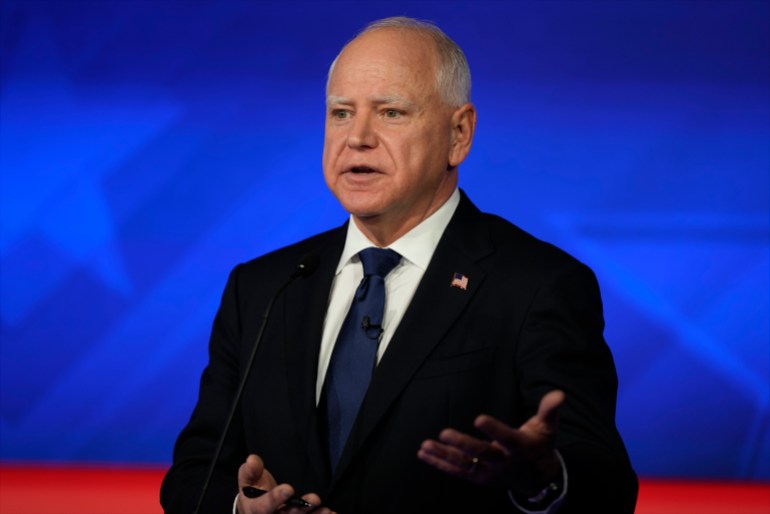
Candidates tackle lowering gun violence
Both Walz and Vance were pressed about how they would address gun violence, particularly in the wake of yet another school shooting.
Just last month, on September 4, the swing state of Georgia suffered the deadliest school shooting in its history, when a 14-year-old suspect brought an AR-15-style rifle to Apalachee High School.
When asked how to lessen the risks, Vance took a more resigned approach, implying that gun violence was a fact of life.
“We know, unfortunately, a lot of kids are going to experience this terrible epidemic of gun violence,” he replied.
“The idea that we can wave a magic wand and take guns out of the hands of bad guys, it just doesn’t fit with recent experience.”
Vance suggested the best solution was to beef up security on campuses across the country.
“I unfortunately think we have to increase security in our schools,” he said. “We have to make the doors lock better. We have to make the doors stronger. We’ve got to make the windows stronger. And of course, we’ve got to increase the school resource officers.”
Walz, meanwhile, played up his identity as a gun owner, as Harris herself has done in recent weeks, in an effort to defuse perceptions that Democrats are anti-gun.
“I’m a hunter. I own firearms,” he said. “I’m of an age where my shotgun was in my car so I could hunt pheasant after football practice.”
Still, Walz argued certain gun reforms were needed to protect American children, though he remained vague on the specific actions he would advocate.
“There are reasonable things that we can do to make a difference,” Walz said.
“No one’s trying to scaremonger and say we’re taking your guns, but I ask all of you out there: Do you want your schools to be hardened to look like a fort? Is that where we have to go, when we know there are countries around the world where their children aren’t practising these kinds of [school shooting] drills?”
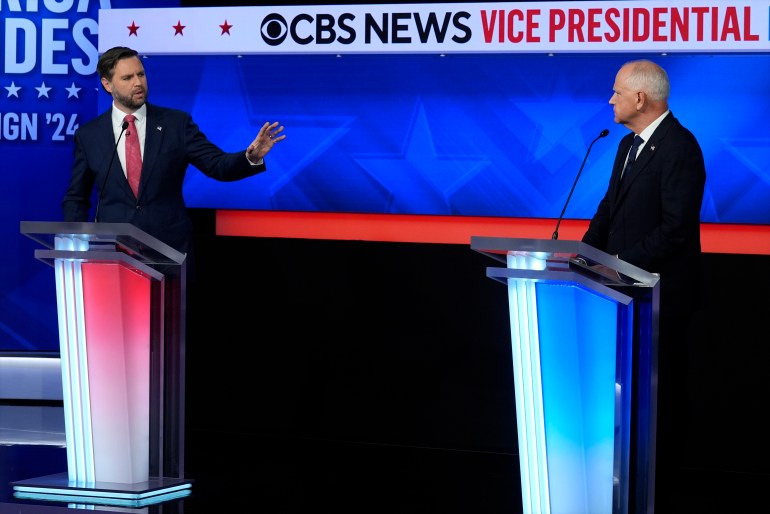
Walz pushes Democrats’ advantage on abortion
Another flashpoint during the debate was the question of abortion access, an issue slated to be on the ballot this November in approximately 10 states, including battlegrounds like Nevada.
Abortion is often seen to be a winning issue for Democrats, and Walz attempted to use the debate stage to highlight the consequences of overturning Roe v Wade, the Supreme Court decision that formerly established a constitutional right to abortion access.
Walz underscored that Trump-appointed judges on the Supreme Court ultimately ended the precedent set in Roe v Wade, in a controversial 2022 decision. That, in turn, left states with the power to decide whether abortion access would be legal within their borders.
“How can we, as a nation, say that your life and your rights – as basic as the right to control your own body – is determined on geography?” Walz said, recounting the stories of women whose lives were endangered by lack of abortion access.
“Donald Trump put this all into motion,” he added. “He brags about how great it was that he put the judges in and overturned Roe v Wade – 52 years of personal autonomy.”
While the Republican Party has long been outspoken in its opposition to abortion access, Vance sought to strike a more neutral tone during the debate, focusing instead on social programmes to support families.
“My party, we’ve got to do so much better of a job at earning the American people’s trust back on this issue,” Vance said, seeming to acknowledge reproductive rights as a point of weakness in the party platform.
“I want us in the Republican Party to be pro-family in the fullest sense of the word. I want us to support fertility treatments. I want us to make it easier for moms to afford to have babies.”
Vance had previously supported a nationwide ban on abortion, a position he did not reiterate in Tuesday’s debate.
The two men also clashed over Trump’s track record on election denialism: Trump has long claimed the 2020 election was “stolen” from him through massive voter fraud.
“It is really rich for Democrats to say Trump is a unique threat to democracy when he peacefully gave over power on January 20 as we have done for 250 years in this country,” Vance said.
Walz, meanwhile, dismissed the equivocation and called on Vance to put a stop to the false election claims.
“This has got to stop. It is tearing our country apart,” Walz said. He challenged Vance to stand up to Trump, as former Vice President Mike Pence did in 2021.
“Where is the firewall with Donald Trump? Where is the firewall if he knows he can do anything, including taking an election?” Walz asked. “Will you stand up? Will you keep your oath of office even if the president doesn’t?”
